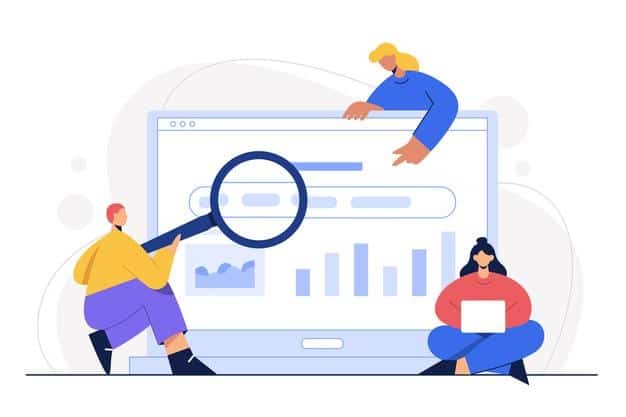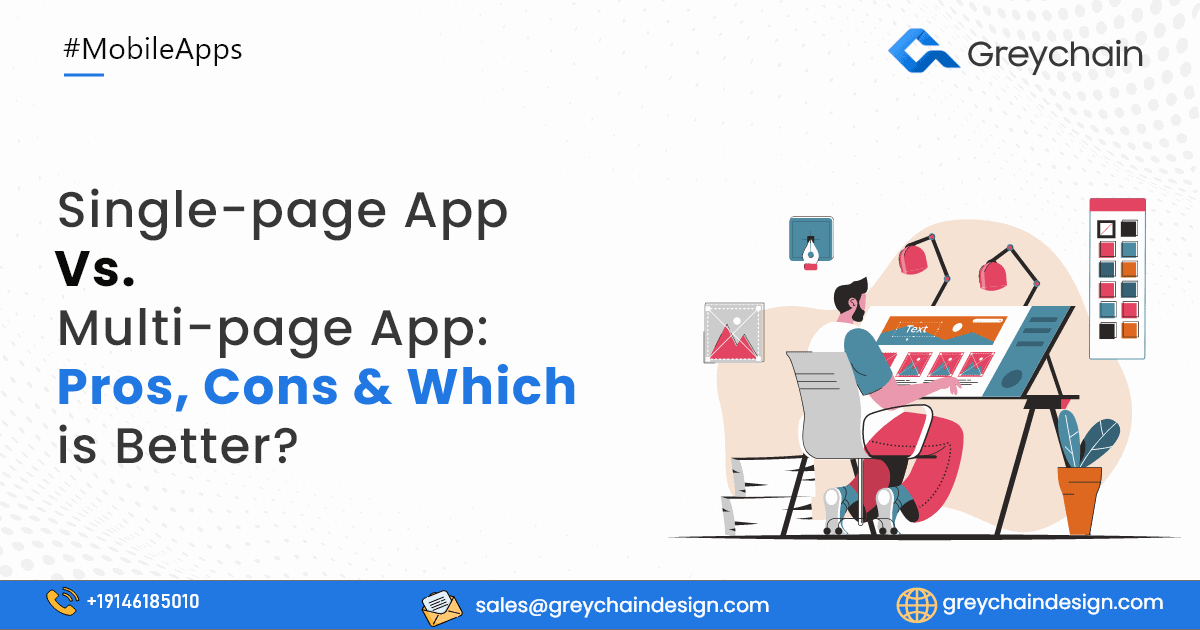Every modern business finds it convenient to promote their products and services via mobile applications. Mobile apps have become part of our lives, and are used in several day-to-day activities. Moreover, it is the utmost channel to communicate and interact with our clients anytime and anywhere. Generally, companies planning to build their dedicated mobile application mainly move with two options; single-page app (SPA) and multi-page app (MPA). Now, both channels have their own pros and cons, that is to consider as per the company’s specific requirement.
Be it a single page application or a multi-page mobile app, the goal is to dispense eminent experience to the users. So, how to decide if our project compiles with SPA or MPA?
There are different elements that we can compare in each channel so that we can come to a conclusion if to choose single-page application architecture or move with a multi-page design.
Let’s understand each channel in detail below:
Difference between Single Page Application and Multi-Page Application:

On reload, a single-page app refreshes the data that is necessary for the users. Whereas, in a multi-page app, the complete data got reloaded. For instance, when a user opens a SPA, the server responds to the request by loading the whole page and then transfers the required data in the form of JSON files.
1. Single Page Application (SPA):
In simple terms, it is a single web page that keeps updating the data from the server. It rewrites the web body content of the specific page. The system supports the users to use the web page without reloading the complete page from the server, but only the necessary web page elements. The technology certainly results in better performance, flexibility and scalable UX.
Popular single page application examples: Gmail, Pinterest, Twitter, Evernote etc.
Advantages:
- Performance: Every element is loaded at once and afterwards the required is modified while interacting with the page. This grows the page performance efficiently.
- Improved UX: As there is only one web page, it provides a flexible and comfortable interface to the users. They stick to the same page and explore the options all in one place. User friendly to all age groups.
- Data Collection: The users can access the information in offline mode with the help of local data stored in the cache. Google Docs is a perfect example that enables users to work in offline status.
- Quick Development: Generally, it is a faster development process. As most of the codebase is the same, the developers can reuse the coding elements. Moreover, it takes less testing time.
- Easy Debugging: Most debugging tools are of popular frameworks such as AngularJS, React, Vue.js etc. that comfortably complete the process with ease.
Disadvantages:
- Challenges with SEO: As there is only one web page without any fixed information, it is obvious that it will create challenges for the SEO. There aren’t different web links to optimize the particular services which certainly create issues for the search engines to identify the data.
- HIgh Download Time: In case of large, composite and weak optimization, the browser will certainly take more time to load the data.
- Mandate JavaScript: This is a must feature for users to use the complete app functionalities. Users are required to enable the JS for their specific browsers.
2. Multiple Page Application (MPA):
MPA is a web application that contains a large set of web pages. These pages get refreshed every time there is new data. This information exchange to the server (back and forth) results in the browser as a new web page. It is a common architecture used by most companies, eCommerce sites, bloggers, forums, directories etc.
Popular multi-page application examples: eBay and Amazon
Advantages
- Easy SEO Optimization: As there are multiple pages in the app, each page can be optimized to target a specific audience to obtain organic traffic from the search engines.
- Effortless Scaling: It is constructively helpful in building new web pages to list new products and services; each page for different items. Add or remove the listing anytime.
- Ready-made Solutions: Generally, MPA solutions come with a diverse range of pre-built tools that are easy to configure and use. Besides, it takes small technology stacks that don’t require major development efforts.
- Precise Tracking: With the help of Google Analytics integration, we can track our website visitors and monitor each webpage’s performance.
Disadvantages:
- Low-Performance Chances: If your company provides a large number of web pages, it will possibly affect the performance to load the same and slow down the speed. This can be found if you have large website traffic or use multiple functionalities.
- App Maintenance: Similar to the performance, it generally takes a much longer time to fix errors and bugs as there are a large number of web pages. This also applies to security measures.
- Tight Integration: MPA works on a deep integration module that takes a longer development and testing time.
Conclusion: What to Choose; SPA or MPA?
As per the above classification, both app elements have their own set of advantages; there isn’t that one is better than the other. Basically, it depends on the app requirements that best match the specific app architecture.
In simple terms, if your project consists of multiple web pages, and if SEO is an imperative part of your digital marketing, then MPA suits best to your business requirement. Evaluate the client task requirements, understand your business specifications and consult with your team. If you have single page app ideas or are looking towards multi-page app technology, a reliable team of experts will definitely support you to make the correct decision.
Related Read: Do You Know the Reasons Why Users Are Uninstalling Your App?
Reach out to Grey Chain Technology- iOS and Android App Development Services
Grey Chain Technology is a web and mobile app development company in the USA. We provide a diverse range of iOS and android application development services, working with the latest technologies and app-building tools.
Our team of experts is proficient in single page application angular, native, hybrid and cross-platform app development services.
Check out our portfolio here!
Connect with our experts over the phone at +1 914 618 5010 (US) / +91 9667665464 (IND) or send us your requirements via email at sales@greychaindesign.com.
We would be happy to discuss your app specifications.

 Get in Touch
Get in Touch
